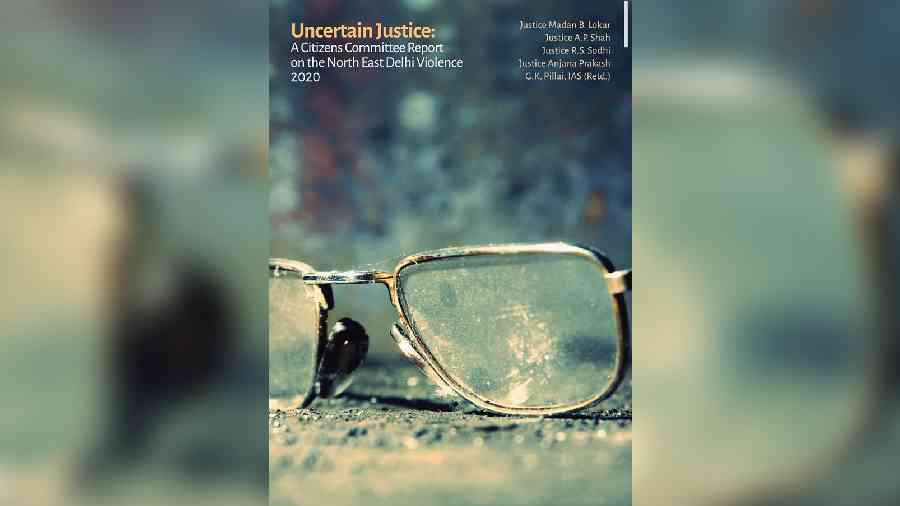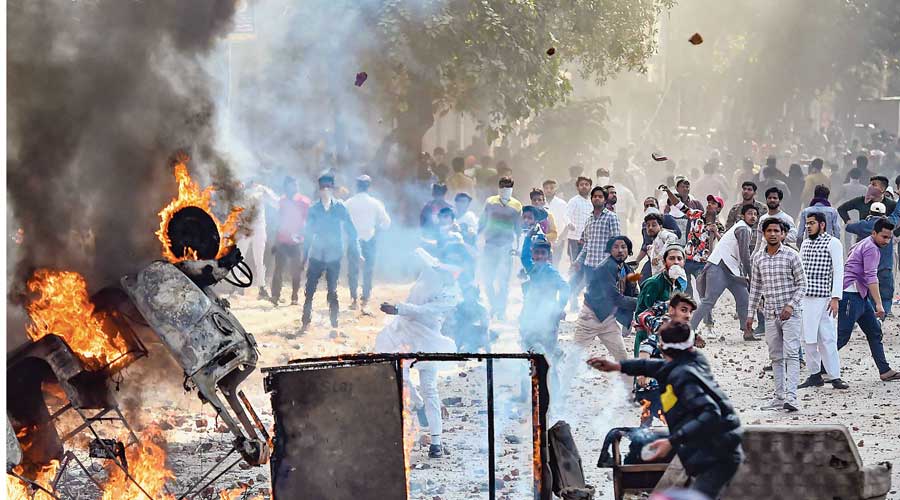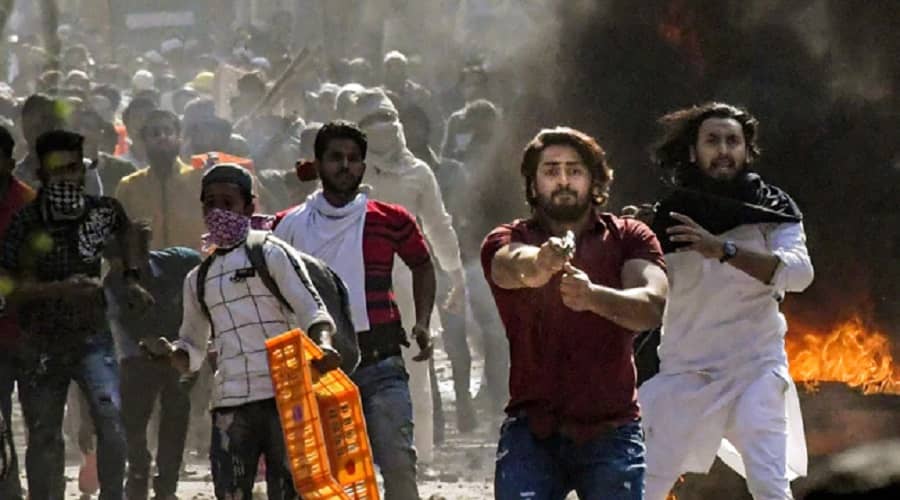A report by a panel of retired judges and a former Union home secretary has accused the central and Delhi governments of “glaring failures of constitutional duties” during and after the February 2020 communal riots in the capital.
It has accused the Centre of delayed response and the state government of failing in “civic mediation and statesmanship” and in providing adequate relief later, and cited reports of police complicity in the violence that killed 53 people, mostly Muslims.
The report has also highlighted the incendiary speeches by BJP leaders, and the police’s failure to act against them.
A note of dissent from one of the panel members, who withdrew before completion of the report, disagreed with the “very generalised inference” of “police complicity”. But the member did not rule out “some cases where police complicity with Hindu mobs did contribute to violence”.
The report has, like several earlier probe reports on the Delhi riots, demanded a commission of inquiry “to establish the factors that led to the violence and issues of accountability and reparations in its aftermath”.
The panel, called Citizens Committee, was led by the former Supreme Court judge, Justice Madan B. Lokur. It included a former chief justice of the high courts in Madras and Delhi, Justice A.P. Shah; a former Delhi High Court judge, Justice R.S. Sodhi; a former Patna High Court judge, Justice Anjana Prakash; and retired home secretary G.K. Pillai.
The former DGP of the Bureau of Police Research and Development, Meera Chadha Borwankar, quit the committee and gave a dissent note, which has been published with a response from the panel.
The initiative to study the riots was taken by the Constitutional Conduct Group of retired civil servants.
The report says: “It is documented that the police were in receipt of intelligence alerts from internal sources, of impending trouble in North East Delhi on February 23 itself.”
It adds that the police ignored an incendiary speech delivered the same day by BJP member Kapil Mishra —whom the police later gave a clean chit in court --- and were too late to impose curfew. The report also lists recorded instances of the police participating in rioting or encouraging rioters.
The report adds: “The role of the police must be more critically examined to determine the full extent and nature of complicity, including whether the lack of effective preventive action constitute complicity as an act of omission. Towards that end, it is imperative that the investigation is entrusted to a body other than the Delhi police, and which is not under the direct control of the ministry of home affairs (MHA).”
Dissent note
In her dissent note, Borwankar has said: “Having gone through all the material with the committee and information from different reliable sources, I believe that a part of the anti-CAA protests could have been orchestrated by anti-national and hostile foreign forces though major segment of the agitation consisted of spontaneous response of a community that felt alienated and discriminated against. Deeper enquiry into it is called for.”
The police have started a terror case against 18 people, including students and activists, linking the citizenship protests to the communal riots. Six have received bail. More than 17,000 pages of chargesheets were filed in two instalments in September and October 2020, but the trial is yet to begin.
Borwankar has added: “I do not agree (with) the very generalised inference that ‘police complicity with Hindu mobs were contributing features of the violence’. However, I do not rule out some cases where police complicity with Hindu mobs did contribute to violence.”
Rebuttal
The panel has responded to her, saying: “As regards the possibility that a part of the anti-CAA protests ‘could have been orchestrated by anti-national and hostile foreign forces’, we have not come across anything to suggest, let alone support, such a hypothesis in all the material considered by us.
“Our examination of the first chargesheet in FIR 59, which deals with the subject of the larger conspiracy behind the violence, does not support a finding to this effect. In any event, investigation in FIR 59 is still ongoing, and covers the field in this matter.”
The panel has added: “The report compiles specific instances of police complicity from the reported material on the subject. We believe this is sufficient to warrant an independent inquiry, which would need to be extensive.”
The report cites the chargesheet filed in relation to FIR 59, “to show that the numbers of police personnel deployed were not suitably increased on February 24 and 25, which is when the maximum number of distress calls were received by police stations”. For this, the report blames the home ministry, which has the power to deploy central armed police.

The cover of the report
Grave failure
It adds: “With the information on hand at the outset, it is a grave failure on the part of the Delhi police leadership and the MHA that police and security force deployment was not immediately stepped up. More recent events in Delhi testify to how rapidly security force deployment can take place in the city.”
This was a reference to the swift police action following the violence during a Hanuman Jayanti procession in Delhi’s Jahangirpuri locality this year.
Delhi govt
On the role of the Delhi government, the report says: “While the Delhi government’s ability to control violence is limited as the administrative control over the Delhi police remains with the central government, it failed to exert the role of civic mediation, and statesmanship, to calm the situation…. Additionally, the Delhi government, which is directly responsible for ensuring relief and compensation, failed to discharge this role in a meaningful way.”
By March 2021, the Delhi government had granted more than Rs 26 crore as compensation to the families of the riot victims.
‘Perversion of law’
On the police’s probe, which blames Muslims for the violence, the report says: “Moreover, the material in the chargesheet (of FIR 59) also does not credibly canvass the proposition that persons advocating the repeal of the CAA, a law that purportedly discriminates against Muslims, intended to strike terror in the Hindu community.
“On the contrary, as demonstrated through the official data in earlier chapters, an overwhelming number of victims who were killed, physically assaulted, and suffered loss and damage of property were Muslims. Further, a large number of mosques were damaged and there was a disproportionate impact on the minority community.
“The incongruity of ‘Muslim persons’ organising riots in Muslim-dominated areas, killing Muslim victims mainly and burning mosques in order to protest against a law that is allegedly discriminatory towards Muslims has been noted by the courts. This ill-conceived and unsubstantiated application of (the anti-terror law) UAPA to the present case is not merely stretching the law, but a perversion of the law and appears targeted.”
It adds: “A comparison of the investigation in the IPC FIRs (such as FIR 48, 49 and 50) with the investigation into the same allegations in FIR 59 also reveal(s) irreconcilable differences about critical features of the same incident…. On one hand, the police have omitted to investigate the connection of the breakout of violence with the offending utterances mentioned above, while on the other, subjected certain anti-CAA protesters to a UAPA prosecution for allegedly committing violence targeted at Muslims.”
The 171-page report accuses Hindutva extremists, including “BJP functionaries”, of inciting the riots.
“Speeches, statements and slogans by BJP functionaries, prominently Kapil Mishra and Anurag Thakur, characterised the protesters as traitors, enemies, and violent troublemakers, within a divisive Hindu-Muslim binary,” it says.
“Calls for violence against those labelled traitors, through the ‘goli maaro’ slogan, were repeated by political leaders in election rallies, public demonstrations and mass gatherings, with no censure…. Hindu nationalist figures such as Yati Narsinghanand and Ragini Tiwari, as well as local BJP party workers, further spread the hate messaging through social media platforms.
“Facebook, WhatsApp and YouTube were widely used, as described in Chapter 6, to propagate divisive Hindu-Muslim narratives and calls for violence.”
The Election Commission had censured Thakur and BJP parliamentarian Parvesh Verma for their comments, which came during the campaign for the Delhi polls that just preceded the riots.
In 2020, the police had told Delhi High Court that “no actionable evidence has surfaced yet indicating any role being played by” any prominent political leader in “instigating and/ or participating in the riots”.
In a written reply to the Lok Sabha last year, deputy home minister Nityanand Rai had said: “During violence in the northeast part of Delhi, Delhi police acted swiftly in an impartial and fair manner….
“Proportionate and appropriate actions were taken by Delhi police to control the situation. Sincere, dedicated and incessant efforts made by Delhi police brought the riotous situation to normalcy within a short span of time and also prevented the riots from spreading across to other areas of Delhi/NCR.”












